six - Blair and New Labour’s continuation of the journey towards privatisation
Published online by Cambridge University Press: 14 April 2023
Summary
The 1997 general election ended 17 years of Conservative governments and heralded 13 years of Labour in power. Tony Blair became Prime Minister, with Gordon Brown as the Chancellor of the Exchequer. But there was continuity as well as change from the Conservative to New Labour years, with Simon Jenkins titling his 2007 book on the transition and New Labour ‘Thatcher and Sons’, and writing:
Tony Blair had [already] changed the British Labour party beyond recognition. On 2 May 1997, he set out to ‘change Britain’. His objective was not achieve any great policy upheaval. He had shown no interest in reversing the Thatcher revolution and in power respected it. Just as the post-war ‘welfare settlement’ had held sway through the governments of both parties for thirty years, so now the Thatcherite settlement assumed an equal bipartisanship. Debate was how to make it work.
Part of making it work was the focus on the modernisation rather than the abolition of public services. Thatcher had seen public services as wasteful. Creating competition was promoted as the means to drive value for money. The consequence was that more services were delivered through a commercial marketplace by private companies, public servants became the makers of contracts, and managers, rather than professionals, became more powerful and controlling. The contract culture and managerialism had come to dominate the public service agendas. These were all trends which were continued by the New Labour governments from 1997 onwards.
The journey continued, but some of the jargon and processes were reset. Value for money and the focus on the three Es was rebadged as seeking and demanding ‘Best Value’ from public services. There was to be a move away from the Conservative government’s enforced compulsory competitive tendering of public, and especially local authority, services. Instead there was to be a national requirement that all local authority services (there were to be no exceptions so all social services and social work services were captured within this process) were to be opened up to a ‘Best Value’ analysis and appraisal which was to be based on the ‘four Cs’ of compare, challenge, consult and compete.
- Type
- Chapter
- Information
- In Whose Interest?The Privatisation of Child Protection and Social Work, pp. 137 - 153Publisher: Bristol University PressPrint publication year: 2018



